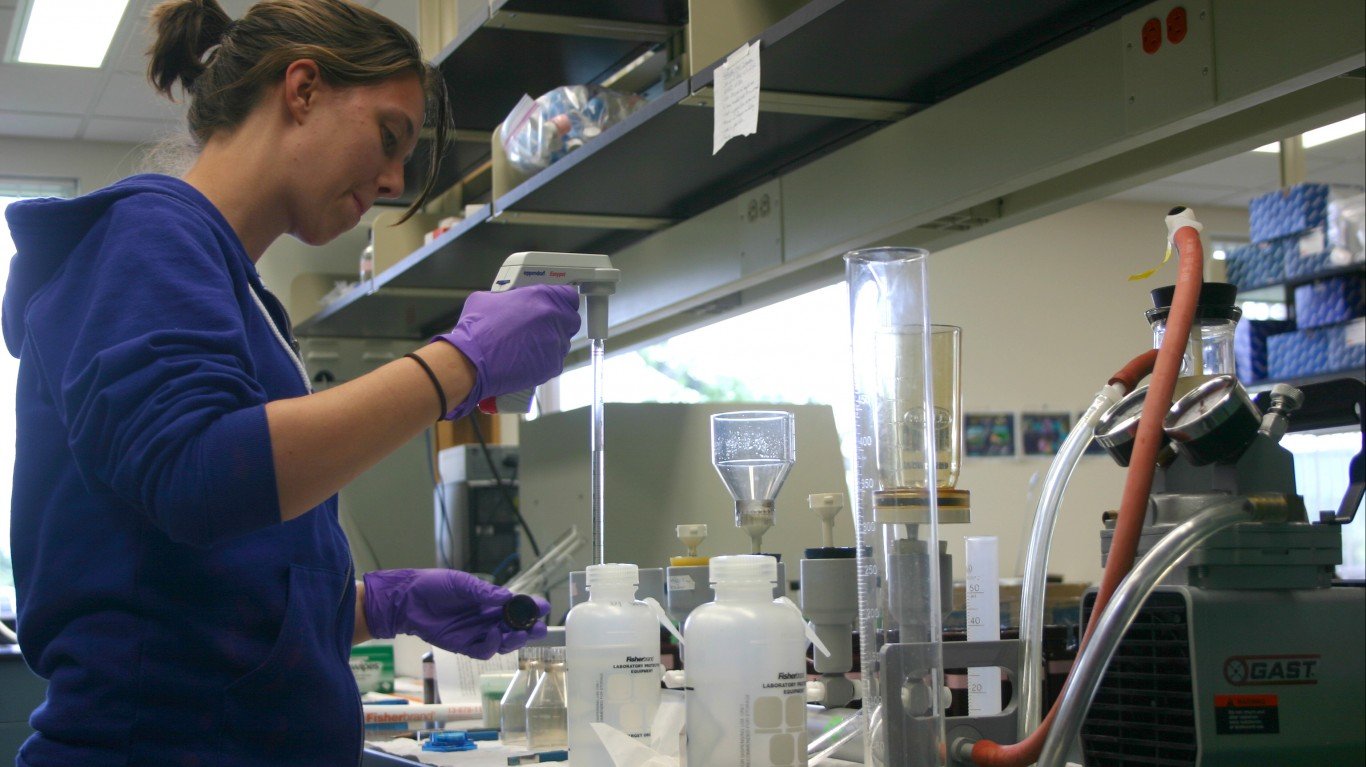

Student loan debt is soaring in the United States, overtaking both auto loans and credit card debt in recent years to become the second largest form of consumer debt, after only home mortgages. Americans have a cumulative total of $1.6 trillion in outstanding student loans.
This record high debt is due in part to climbing tuition costs. The annual cost of attending a four-year private institution in the United States reached $48,510 in 2018, more than double what it was less than two decades earlier. This is how much it cost to attend college the year you were born.
In light of the increasing cost of a four-year education, it is more important than ever for the college-bound to consider the kinds of careers their degrees may lead to, and how much they can expect to earn. Using average annual earnings data from the U.S. Census Bureau’s American Community Survey, 24/7 Wall St. identified the college majors that will pay off the most.
The majors on this list tend to be in mathematics, engineering, or the hard sciences. It is important to note that many of the high-paying careers these subjects often lead to may also require additional education beyond a bachelor’s degree, particularly for careers in medicine or engineering.
Of course, the subject one chooses to focus on in college is only one factor that can have an impact on earning potential later in life. Another is the reputation of the school and the quality of its education. Some of the most well-regarded schools in the country, like Harvard, MIT, and Stanford also have the highest earning graduates. Schools like these tend to be highly selective in their admission process, however. Here is a list of the hardest colleges to get into.
Click here to see the college majors that will pay off the most
Click here to read our methodology

35. Industrial and Manufacturing Engineering
> Avg. annual earnings: $80,775
> 2018 unemployment rate: 3.1%
> Total labor force: 222,080
[in-text-ad]

34. Physics
> Avg. annual earnings: $81,112
> 2018 unemployment rate: 3.3%
> Total labor force: 285,737

33. Naval Architecture and Marine Engineering
> Avg. annual earnings: $81,378
> 2018 unemployment rate: 2.9%
> Total labor force: 18,496

32. Chemistry
> Avg. annual earnings: $81,685
> 2018 unemployment rate: 2.2%
> Total labor force: 582,466
[in-text-ad-2]

31. Physiology
> Avg. annual earnings: $82,028
> 2018 unemployment rate: 2.5%
> Total labor force: 118,401

30. Political Science and Government
> Avg. annual earnings: $82,619
> 2018 unemployment rate: 3.3%
> Total labor force: 1,252,188
[in-text-ad]

29. Transportation Sciences and Technologies
> Avg. annual earnings: $82,827
> 2018 unemployment rate: 2.1%
> Total labor force: 143,950

28. Information Sciences
> Avg. annual earnings: $83,110
> 2018 unemployment rate: 2.9%
> Total labor force: 129,405

27. Zoology
> Avg. annual earnings: $84,304
> 2018 unemployment rate: 1.5%
> Total labor force: 109,436
[in-text-ad-2]

26. Engineering Mechanics Physics and Science
> Avg. annual earnings: $84,511
> 2018 unemployment rate: 1.7%
> Total labor force: 33,861

25. Management Information Systems and Statistics
> Avg. annual earnings: $85,945
> 2018 unemployment rate: 2.5%
> Total labor force: 230,592
[in-text-ad]

24. Biology
> Avg. annual earnings: $86,647
> 2018 unemployment rate: 2.2%
> Total labor force: 1,901,290

23. Mechanical Engineering
> Avg. annual earnings: $87,064
> 2018 unemployment rate: 2.4%
> Total labor force: 906,496

22. Genetics
> Avg. annual earnings: $87,626
> 2018 unemployment rate: 1.2%
> Total labor force: 21,160
[in-text-ad-2]

21. Public Policy
> Avg. annual earnings: $87,795
> 2018 unemployment rate: 2.7%
> Total labor force: 40,685

20. Construction Services
> Avg. annual earnings: $87,875
> 2018 unemployment rate: 1.8%
> Total labor force: 123,377
[in-text-ad]

19. Chemical Engineering
> Avg. annual earnings: $88,301
> 2018 unemployment rate: 2.7%
> Total labor force: 316,250

18. Business Economics
> Avg. annual earnings: $88,370
> 2018 unemployment rate: 2.4%
> Total labor force: 97,311

17. Aerospace Engineering
> Avg. annual earnings: $89,506
> 2018 unemployment rate: 2.5%
> Total labor force: 113,174
[in-text-ad-2]

16. Materials Science
> Avg. annual earnings: $90,686
> 2018 unemployment rate: 2.7%
> Total labor force: 31,356

15. Electrical Engineering
> Avg. annual earnings: $90,803
> 2018 unemployment rate: 2.7%
> Total labor force: 1,061,227
[in-text-ad]

14. Nuclear Engineering
> Avg. annual earnings: $91,336
> 2018 unemployment rate: 1.7%
> Total labor force: 18,922

13. Computer Science
> Avg. annual earnings: $91,563
> 2018 unemployment rate: 3.3%
> Total labor force: 1,330,385

12. Economics
> Avg. annual earnings: $92,744
> 2018 unemployment rate: 3.1%
> Total labor force: 1,105,672
[in-text-ad-2]

11. Biomedical Engineering
> Avg. annual earnings: $94,915
> 2018 unemployment rate: 3.5%
> Total labor force: 66,187

10. Finance
> Avg. annual earnings: $95,511
> 2018 unemployment rate: 2.5%
> Total labor force: 1,228,980
[in-text-ad]

9. Pharmacology
> Avg. annual earnings: $95,683
> 2018 unemployment rate: 0.0%
> Total labor force: 12,762

8. Computer Engineering
> Avg. annual earnings: $97,404
> 2018 unemployment rate: 2.4%
> Total labor force: 367,633

7. Biochemical Sciences
> Avg. annual earnings: $98,027
> 2018 unemployment rate: 2.6%
> Total labor force: 221,984
[in-text-ad-2]

6. Mathematics and Computer Science
> Avg. annual earnings: $100,580
> 2018 unemployment rate: 0.7%
> Total labor force: 17,415

5. Applied Mathematics
> Avg. annual earnings: $100,742
> 2018 unemployment rate: 1.5%
> Total labor force: 40,021
[in-text-ad]
4. Molecular Biology
> Avg. annual earnings: $103,049
> 2018 unemployment rate: 1.2%
> Total labor force: 88,506

3. Health and Medical Preparatory Programs
> Avg. annual earnings: $106,017
> 2018 unemployment rate: 1.5%
> Total labor force: 100,171

2. Petroleum Engineering
> Avg. annual earnings: $107,444
> 2018 unemployment rate: 5.5%
> Total labor force: 26,665
[in-text-ad-2]

1. Actuarial Science
> Avg. annual earnings: $110,110
> 2018 unemployment rate: 1.5%
> Total labor force: 20,766
Methodology
To determine the college majors that will pay off the most, 24/7 Wall St. reviewed data on average annual earnings from the Public Use Microdata Sample summary files of the U.S. Census Bureau’s 2018 American Community Survey for over 170 bachelor’s degree fields. ACS respondents were asked to list majors they completed as part of a bachelor’s degree program, as well as additional questions on earnings, employment status, and workweek.
Data on unemployment among the civilian labor force and the size of the employed workforce for each major also came from the ACS PUMS files. In cases where respondents have received multiple degrees, only the first degree listed was considered.
Essential Tips for Investing: Sponsored
A financial advisor can help you understand the advantages and disadvantages of investment properties. Finding a qualified financial advisor doesn’t have to be hard. SmartAsset’s free tool matches you with up to three financial advisors who serve your area, and you can interview your advisor matches at no cost to decide which one is right for you. If you’re ready to find an advisor who can help you achieve your financial goals, get started now.
Investing in real estate can diversify your portfolio. But expanding your horizons may add additional costs. If you’re an investor looking to minimize expenses, consider checking out online brokerages. They often offer low investment fees, helping you maximize your profit.
Thank you for reading! Have some feedback for us?
Contact the 24/7 Wall St. editorial team.
 24/7 Wall St.
24/7 Wall St. 24/7 Wall St.
24/7 Wall St. 24/7 Wall St.
24/7 Wall St. 24/7 Wall St.
24/7 Wall St. 24/7 Wall St.
24/7 Wall St.



